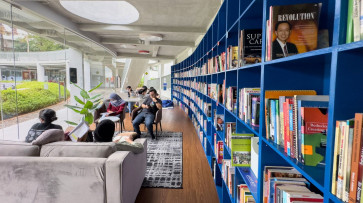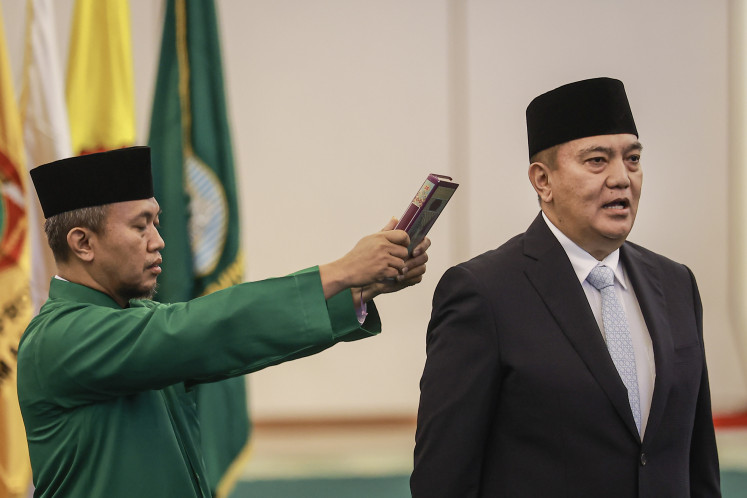What youth really need
Young people are often viewed as a problem group rather than a forceful power that can make a difference
Change text size
Gift Premium Articles
to Anyone

Young people are often viewed as a problem group rather than a forceful power that can make a difference.
But with Indonesia’s youth population reaching 65 million, their voices and participation must become an integral part of the policy making process, especially on issues that affect their lives.
Jointly organized by the National Population and Family Planning Board (BKKBN) with support from partners, including the Bill and Melinda Gates Foundation, Johns Hopkins Bloomberg School of Public Health Center for Communication Program, Rutgers, UNFPA and UNICEF, the first National Adolescents Summit, recently held in Yogyakarta, provided a platform for young people to have an important and irreplaceable role in promoting sexual and reproductive health (SRH).
The main objective was producing a well-rounded program involving all stakeholders committed to bringing SRH to the doorstep of those who need it. The most important ingredient of this process was youth participation and engagement.
“Young people have the energy to drive changes in their communities. They must be given wide access to information and knowledge on reproductive health and family planning services,” said Melinda Gates, co-founder of the Bill and Melinda Gates Foundation, in addressing the summit.
Youth, she said, must be involved from the very beginning as “problem solvers and architects of solutions,” rather than just as beneficiaries.
“With that, Indonesia will have healthy, well-educated and well-informed youth and the economic returns will be huge. Indonesia will be able to reap its demographic dividend in the coming years.”
Youth leaders from diverse organizations, including the Indonesian Youth Alliance (ARI), Association of Indonesian Medical Students, Genre, Fathayat, PKBI’s youth associations and others gathered for three days to address various challenges and to come forward with drafts of solutions.
Auzan Haq, a member of the Center for Youth Information and Consultation in Makassar, South Sulawesi, said he hoped the summit would open doors to more collaboration among youth groups, the government, private sector, civil society and donors.
“The government, civil society groups and the media have the responsibility to educate adolescents on reproductive health. There is nothing taboo about this.”
Pre-marital sex among teens is a subject considered taboo in the country. It goes against traditional Indonesian social and cultural norms, yet a lot of young people in big cities as well as those living in remote villages are sexually active.
“We cannot ignore this fact by sitting doing nothing,” said Marselina Putri Yamina Manimoi, 21, a peer educator from Kupang, East Nusa Tenggara.
“Early sexual interactions are common and regarded as something to be proud of. Sex is seen as proof of love,” said Manimoi, adding that this has resulted in an increasing number of unwanted pregnancies and teen marriages in Eastern Indonesia.
“This happens because we do not understand our own bodies. And both our parents and teachers never teach us about this.”
Among participants were numerous young people with physical disabilities. The World Health Organization (WHO) states that persons with disabilities have the same SRH needs as other people. Yet, they often face barriers in accessing information and services.
WHO also adds that persons with disabilities may actually have greater needs for SRH education and cares due to their vulnerability to abuse.
Persons with disabilities are up to three times more likely than non-disabled persons to be victims of physical and sexual abuse, including rape.
Nineteen-year-old Hariyan Tuah Miko, a physically disabled teen and activist of Young Voice Indonesia from Aceh, expressed concerns with the state of SRH awareness.
According to Miko, there are hundreds of disabled youth in Aceh. “In Aceh, many parents hide their disabled children, who are regarded as a disgrace to the family. Therefore, it is almost impossible for disabled youth to get any information on SRH, let alone its services.” Aceh is the only province in Indonesia where practice of Sharia law is strictly enforced.
Many disabled girls in the province are victims of rape, sexual abuse and violence.
Wulaninka, a Jakarta-based member of Young Voice Indonesia and wheelchair user, said that very few organizations provided services and information for adolescents with physical disabilities. What the youth need, she said, was youth-friendly information and non-discriminatory, non-judgmental reproductive health information centers and services.
“We want to make sure that our voices and concerns are included throughout the process of designing programs and formulating policies on SRH for all youth.”









